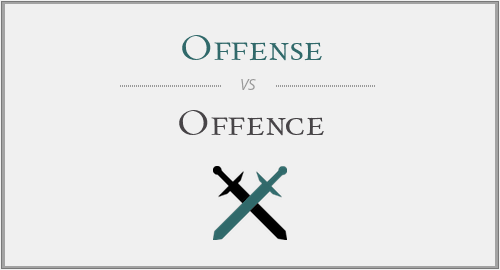Is there any notable difference between “offense” and “offence”? Some might think that it’s the same situation as “advise” and “advice”, that one is the verb and the other is the noun. Others already know for sure that there is no verb such as “offense” or “offence”, but consider that one of these is a misspelling.
With so many opinions, wrong uses of the words in online publications or daily conversations and overwhelming situations where you have to choose between “offense” and “offence”, this choice can become really confusing. Grammar.com will clear things up for you quickly and easily.
Offense vs. Offence
They are almost identically spelled, but is “offense” the same with “offence”? To keep it short, yes. They are perfect synonyms and you can replace “offense” with “offence” and vice-versa in any context, without having your message affected in any way.
What is, then, the reason why they are spelled differently? Again, the answer is simple and quick: it’s all about distinct spellings in UK and US English. British prefer it spelled “offence” and Americans recommend “offense”. Other than that, nothing else influences the choice of the spelling for this pair of words.
When do we use “offense”?
“Offense” is preferred by American English users and it is used with the same meaning as “offence”. The word is a noun and it defines something rude that makes someone upset or feel bad. In other contexts, the word can also be used to define a crime. However, it is recommended that you spell it “offense” especially if you are communicating with a native from US or an American English speaker.
Example 1: I’m sorry if my words hurt you, I didn’t mean to bring you any offense. – “offense” is usually used when something makes someone upset.
Example 2: He was arrested for every horrible offense he committed in the supermarkets of this city. – “offense” refers, in this case, to a crime.
When do we use “offence”?
“Offence” is also a correct spelling, officially accepted by any dictionary and specialist, and it can be used correctly in any of the contexts presented above, where “offense” can appear as well. Anyway, it is definitely more appropriate to use “offence” in British English, especially if you are trying to demonstrate your linguistic elegance. It’s a matter of consideration for UK English users and their spelling preferences.
Conclusion
Both “offense” and “offence” are correct spellings of the same noun, both having the same meaning. The only difference is that “offense” is preferred in US English and “offence” is used by UK English. A quick trick to remember which one to use is to keep in mind that the “s” from “offense” also appears in “US”, and not in “UK”. But after all, your message will still be understood correctly, no matter what spelling you choose. So you don’t really have to worry about it, unless you are writing academically or in official purposes, where these subtleties actually matter.





Have a discussion about this article with the community:
Report Comment
We're doing our best to make sure our content is useful, accurate and safe.
If by any chance you spot an inappropriate comment while navigating through our website please use this form to let us know, and we'll take care of it shortly.
Attachment
You need to be logged in to favorite.
Log In